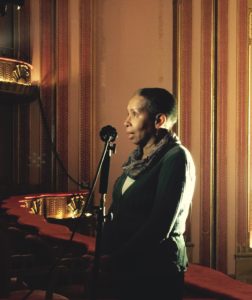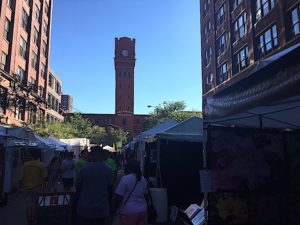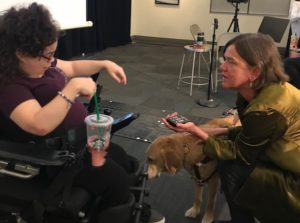Can’t speak for Texas, but 3rd graders I visit love learning about Helen Keller
September 26, 2018 • 10 Comments • Posted in blindness, careers/jobs for people who are blind, politics, visiting schoolsYou may have heard earlier this month that the Texas School Board recommended the removal of Helen Keller from its required Grade 3 social studies curriculum. The story of Helen Keller’s childhood is well-known. She lost both her hearing and her sight after a childhood illness, and after the breakthrough moment when teacher Anne Sullivan communicated “water,” young Helen Keller learned to read, write and even speak.

I had the honor of speaking at the Perkins School for the Blind early this year. Helen Keller attended Perkins–the courtyard garden is named in her and Annie Sullivan’s honor.
What many people don’t know is that Helen Keller became a radical activist when she grew up. She joined the Socialist Party in 1909, when she was 29, and then the Industrial Workers of the World. She supported Communist Russia and hung a red flag over her desk. The FBI opened a file on her. She advocated for women’s suffrage and for access to birth control. She helped found the American Civil Liberties Union.
Through all that Helen Keller remained the darling of newspaper reporters and columnists, the amazing blind and deaf girl who talks with her hands. When she came out in support of Socialist Party candidate Eugene V. Debs in his campaign for the presidency, though, that was the last straw. Newspaper columnists who had earlier praised her courage and intelligence started calling attention to her disabilities.
One newspaper claimed “the poor little blind girl” was being exploited by the socialist party for publicity’s sake, and the editor of the Brooklyn Eagle wrote that Helen Keller’s “mistakes sprung out of the manifest limitations of her development.”
No matter where you stand politically, I’m sure you can appreciate what a blow this must have been to Helen Keller. She had waited to formulate her opinion until after procuring and reading books about socialism in German Braille, and then asking a friend to come three times a week to spell articles from The National Socialist into her hand. From an Essay by Helen Keller:
She gives the titles of the articles and I tell her when to read on and when to omit. I have also had her read to me from the International Socialist Review articles the titles of which sounded promising. Manual spelling takes time. It is no easy and rapid thing to absorb through one’s fingers a book of 50,000 words on economics. But it is a pleasure, and one which I shall enjoy repeatedly until I have made myself acquainted with all the classic socialist authors.
Helen Keller responded to that Boston Eagle article and referred to a time she’d met the editor years earlier:
At that time the compliments he paid me were so generous that I blush to remember them. But now that I have come out for socialism he reminds me and the public that I am blind and deaf and especially liable to error. I must have shrunk in intelligence during the years since I met him…
Helen Keller was a saint until she ruffled feathers, and then they said she was limited intellectually. Instead of addressing her arguments, her critics took pains to discredit her, herself. Sound familiar?
The personal attacks and general nastiness in our public discourse and politics is nothing new. Lots of folks who eventually came to be revered by the broader society — Martin Luther King, Jr., Eleanor Roosevelt, even Muhammad Ali — were reviled as marginal troublemakers and suffered hateful treatment in their own time. I suppose they’re not on the Texas Board’s list of required third grade curriculum, either. If so, Helen Keller is in good company.
Note: the September 14 vote was preliminary, and the Texas Board can amend the curriculum changes further before taking a final vote in November.


